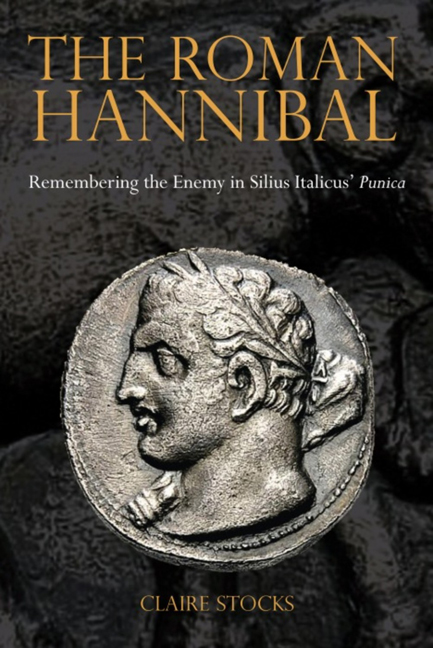Book contents
- Frontmatter
- Contents
- Acknowledgements
- Texts and Translations Used
- Introduction: Silius Italicus and the Roman Hannibal
- Chapter One The Roman Hannibal Defined
- Chapter Two Before Silius: The Creation of the Roman Hannibal
- Chapter Three Silius' Influences
- Chapter Four Epic Models
- Chapter Five Silius' Roman Hannibal
- Chapter Six Out of the Darkness and into the Light
- Chapter Seven Hannibal's Decline after Cannae: Separating Man from Myth
- Chapter Eight Imitators and Innovators
- Chapter Nine Band of Brothers
- Chapter Ten The ‘Lightning Bolts’ (Fulmina) of War
- Chapter Eleven The Man and his Myth: The Self-Defined Roman Hannibal
- Conclusion: The Crossing of the Worlds: The Move from Internal to External Narrative
- Bibliography
- General Index
- Index locorum
Chapter Eight - Imitators and Innovators
- Frontmatter
- Contents
- Acknowledgements
- Texts and Translations Used
- Introduction: Silius Italicus and the Roman Hannibal
- Chapter One The Roman Hannibal Defined
- Chapter Two Before Silius: The Creation of the Roman Hannibal
- Chapter Three Silius' Influences
- Chapter Four Epic Models
- Chapter Five Silius' Roman Hannibal
- Chapter Six Out of the Darkness and into the Light
- Chapter Seven Hannibal's Decline after Cannae: Separating Man from Myth
- Chapter Eight Imitators and Innovators
- Chapter Nine Band of Brothers
- Chapter Ten The ‘Lightning Bolts’ (Fulmina) of War
- Chapter Eleven The Man and his Myth: The Self-Defined Roman Hannibal
- Conclusion: The Crossing of the Worlds: The Move from Internal to External Narrative
- Bibliography
- General Index
- Index locorum
Summary
Marcellus
The separation that can now be seen between the declining man and the continuing martial prowess of his myth creates a void in the Punica that allows other warriors to usurp Hannibal's place as the foremost uir of the epic. Prior to Cannae we saw soldiers, such as Scipio Maior and Paulus, whose martial traits placed them on a par with Hannibal, allowing us to view them in Hannibalic terms and as the embodiment of Jupiter's idealised Roman warriors. Now, with the Carthaginian in martial decline, Rome's uiri have the opportunity not just to be ‘Hannibalic’, but to assume his role – to become a pseudo-Hannibal. And so Marcellus, already named by Jupiter as one of Rome's ideal warriors (3.587), in Sicily can be viewed as another Hannibal, replaying the Carthaginian's siege of Saguntum.
The first reference to Marcellus occurs in Book (1.133); here Marcellus is not referred to by name but by the spolia opima he won in 208 bc when he killed a Gallic chieftain. By depicting Marcellus thus, Silius defines him first and foremost as a warrior par excellence (1.132–3), paving the way for his later assimilation with Hannibal. Marcellus’ gift of the spolia opima to Jupiter (1.133) indicates the divinely favoured position he holds in the Punica, and whilst he lacks the support of a divine cheerleader (cf. Juno for Hannibal), or the divine parentage of Scipio, Marcellus will prove to be singularly favoured by Jupiter, even at his death (15.363–5).
It is not until Book 11 that Marcellus appears in person, when he angrily dismisses the envoys from Capua, bursting out with martial fury that marks him as an individual amongst Rome's warrior collective, and jars with the domestic setting of the senate: impatiens ultra gemitu cohibere furorem,/ fulminea toruum exclamat Marcellus ab ira (11.98–9). Like Hannibal in Book 1 (e.g. 1.66–9), our first sight of Marcellus marks him principally as a warrior incompatible with any environment save for the battlefield.
On the battlefield at Nola Marcellus’ potential to emulate Hannibal is further evident when he calls his men to arms (12.168–9). Unlike previous Roman commanders, whose pro-active approach to war led to disaster, Marcellus succeeds in his role as man of action, bringing the war to his Carthaginian foe.
- Type
- Chapter
- Information
- The Roman HannibalRemembering the Enemy in Silius Italicus’ Punica, pp. 147 - 166Publisher: Liverpool University PressPrint publication year: 2014



